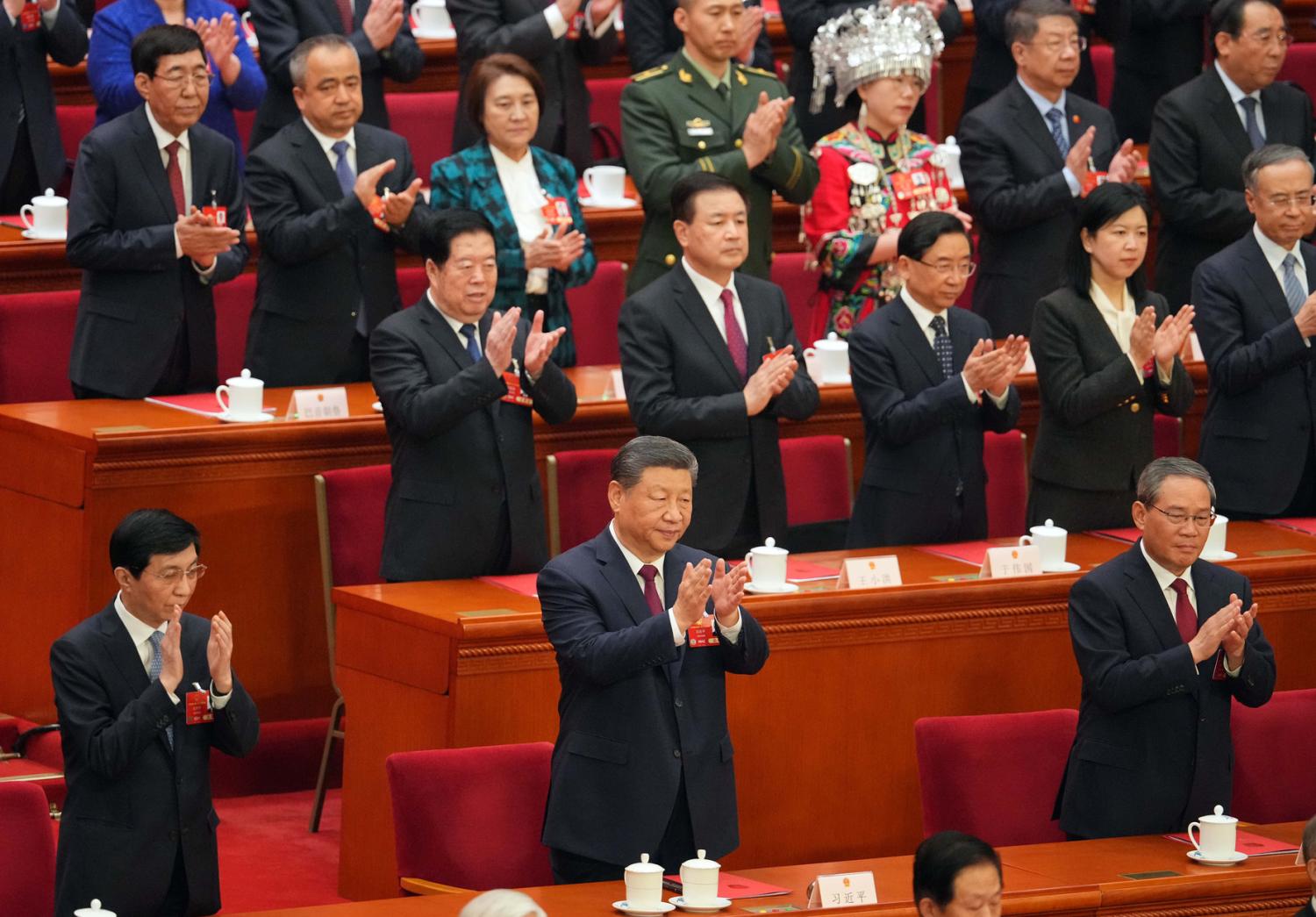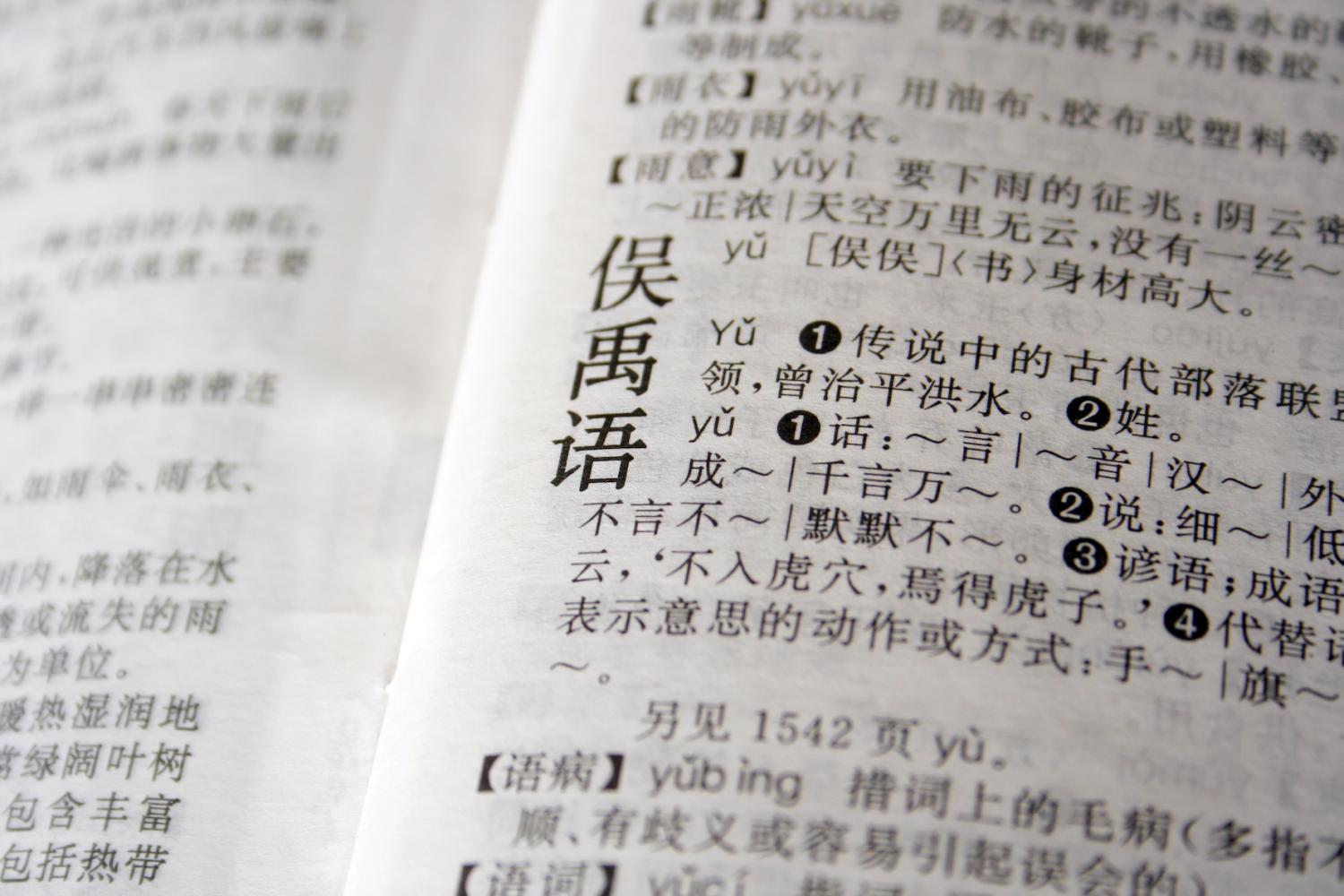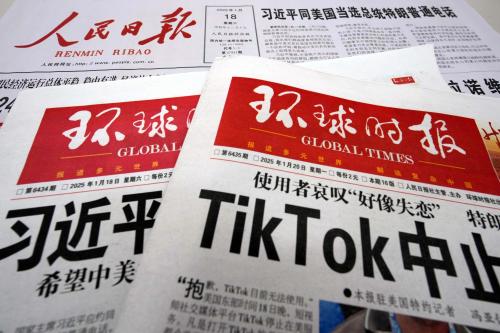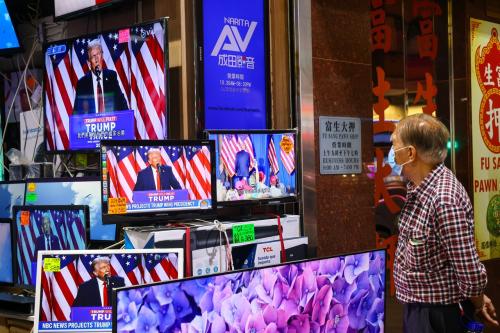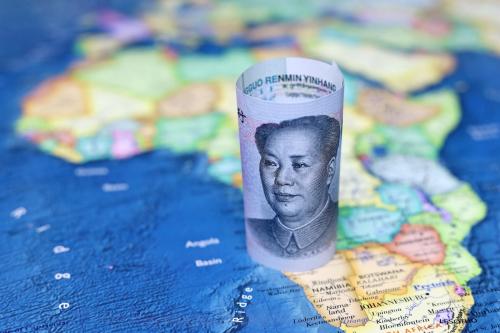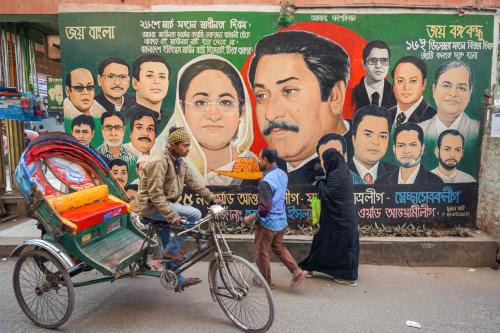This is the ninth essay of Global China’s “Lost in translation: Decoding Chinese strategic narratives” series. The full collection of essays can be found here.
The People’s Republic of China (PRC) is drafting its first authoritative law on the private economy to help bolster the confidence of its embattled but economically crucial private sector. Chinese authorities credit private enterprise, ranging from sewing machine workshops to tech upstarts like DeepSeek to Fortune 500 companies like Alibaba and battery-maker BYD, with delivering more than 60% of GDP, 70% of technological innovation, and 80% of urban jobs. Nonetheless, unstable policies, discriminatory enforcement, and market access and financing obstacles, exacerbated by COVID-19 disruptions, U.S.-China tensions, and lackluster domestic demand, have fueled a serious contraction in private investment. Responding to growing business pressure for stronger legal guarantees of fair competition and equal treatment between the state and private sectors, China’s central government, the State Council, and the national legislature expedited the drafting of a Private Economy Promotion Law (民营经济促进法; PEPL). Spurred by the Chinese Communist Party’s (CCP) call in December for the law to be finalized within the year, the law is slated for passage later in 2025.
The first draft published for comment by the National People’s Congress (NPC) Standing Committee contains little new in terms of legal or policy initiatives, apart from its somewhat problematic definition of promoted private businesses. It restates existing policies and legal requirements that have failed to resolve the sector’s legal challenges, emphasizes political correctness, and seems unlikely to succeed on its own to substantially reassure private investors and spark entrepreneurial enthusiasm. Although foreign direct investment fell by 27.1% in 2024, and China is courting foreign as well as domestic investors, the draft notably excludes majority foreign-owned companies and maintains a segregation of the Chinese economy into state, private, and foreign-owned sectors.
The private sector’s complex legal framework
The PRC’s enduring ideological struggle over how to treat the non-state-owned economy intensified after the 1978 Reform and Opening initiative, with evolving CCP policy reflected in China’s constitutional development. Not even acknowledged in the first post-reform 1982 Constitution, the private (私营; siying) economy was initially permitted (允许), as is foreign investment, and characterized, like the urban and rural workers’ individual economy (个体经济), as a “supplement” (补充) to the socialist public economy, which is the PRC economic system’s mainstay (主体). After the inventive socialist market economy (社会主义市场经济) replaced the planned economy, constitutional amendments identified the individual and private economies as part of the “non-public economy” (非公有制经济), which constitutes an upgraded “important component” (重要组成部分) of the socialist market economy. The PRC Constitution currently requires the state to protect, encourage, support, guide, supervise, and regulate the non-public economy.
China’s business landscape is now populated by 189 million registered businesses with diverse forms of state, private, foreign, and mixed ownership and operation distributed over thousands of industries. The private sector dominates this landscape, with roughly 181 million entities accounting for about 96% of China’s total business entities. It is composed of 56 million private enterprises (民营企业) and over 125 million unincorporated individual industrial and commercial household businesses (个体户; individual households) run by individuals or families. These business entities are regulated through general laws and specific legislation that covers companies, individual proprietorships, private partnerships, individual households, and foreign-invested enterprises (FIEs). An overarching category of some 52 million small, medium, and micro enterprises (中小微企业; SMEs) with relatively small staffing and business operations, which includes private and foreign-invested enterprises, also enjoys its own law. Although the CCP and the State Council adopted broadly applicable as well as targeted policies over the last 20 years to encourage, guide, develop, and promote the private economy, and maintained a national private (siying) enterprise regulation until 2018, no national law specifically addresses the private or non-public economies.
What constitutes China’s private economy?
The PEPL draft uses a popular term that has been increasingly utilized during the Xi Jinping administration, minying (民营), rather than the constitutional term siying, for the “private” economy. Minying literally translates as “people” or “civilian”-operated. Chinese scholars viewed the “minying economy” as a useful term to contrast with the state (国营) sector and represent the new, sometimes mixed public-private forms of ownership and operation evolving during China’s economic system reform. “Minying” also avoids the politically negative connotations of siying, which includes the character “si” (私), meaning personal, private, or selfish, and suggests the pursuit of purely private, non-state interests. Nonetheless, some Chinese scholars advocated against using non-legal terms like minying in legislation.
The draft, however, gives new legal meaning to minying. It does not directly define the minying economy but rather defines “private economy organizations” (民营经济组织; minying jingji zuzhi; PEOs) as for-profit legal (incorporated) persons, unincorporated organizations, and individual households legally established in the PRC in which Chinese citizens (公民; gongmin) are the controlling shareholders or actual controllers, as well as the for-profit legal persons and unincorporated organizations they control. Appropriately for this definition, the character min (民) in minying can also stand for “citizen.” Chinese commentators note that the PEO definition’s requirement of citizen control raises questions about its inclusion of various types of ownership arrangements. Uncertainties could be addressed by specifying the kinds of entities that it aims to cover, as does some local minying economy legislation.
By including the large individual household sector and other unincorporated organizations, the PEO definition is more inclusive than the scope of the private (siying) economy under the PRC Constitution. It is also narrower than the scope of the constitutional “non-public economy,” which includes FIEs regardless of their level of foreign ownership or control. The draft, therefore, establishes a new legal category of business entities that fortifies the distinction between the public, domestic private, and foreign-invested economies.
Although the PEO definition excludes FIEs that are not “controlled” by Chinese citizens, it stipulates that foreign investment legislation applies to PEOs that “involve” (涉及) foreign investment. Thus, it appears that PEOs with any non-controlling foreign funding can take advantage of both the provisions of the Foreign Investment Law (FIL) and the PEPL. However, foreign-controlled FIEs, which share with domestic businesses similar operating challenges that are only partially addressed in the FIL, are not entitled to benefit directly from the draft’s provisions. Instead, they must rely on a provision in the FIL that promises equal enjoyment of the state’s various policies supporting enterprise development.
Unfortunately, as noted by several Chinese commenters, the draft does not address the PEPL’s interaction with policies and legislation on SMEs and individual households, although more than 90% of private companies are SMEs, and vice versa. For example, the draft charges the State Council with establishing a “coordination mechanism” to promote the development of the private economy. It does not, however, clarify such a mechanism’s relationship to a similar SME promotion leadership group that was established in 2009—and that, as of 2018, was seeking to address many of the same operating concerns reflected in the draft—or to the “joint mechanism” created to promote individual household development. Moreover, most actions being rolled out to address the business challenges enumerated in the PEPL are targeted at SMEs and do not mention private businesses per se.
Substantive concerns
Published commentary from Chinese lawyers, business associations, and quasi-official research organizations welcomed the draft. The draft reiterates that promoting sustainable, healthy, and high-quality private sector development is a long-standing, major state policy. It provides assurances that PEOs enjoy legal status, market opportunities, and development rights equal to other economic organizations, as well as operational autonomy and equal treatment in competition, investment, financing, and support for technological innovation. It calls for protecting the rights and interests of PEOs and their operators in many respects. It enumerates the multiple matters for which government departments must better follow existing law in dealing with PEOs and prohibits predatory regulatory actions that have long bedeviled the Chinese private sector despite its extraordinary growth. Analyses noted, however, the draft’s lack of new and concrete enforcement mechanisms against illegal government behavior and called for a stronger private economy “protection” or “guarantee” law. A new draft deliberated by the NPC Standing Committee in late February, which was not published, reportedly requires periodic government reporting on private economy promotion efforts to enable legislative oversight, which could afford additional accountability.
According to a 2023 private enterprise survey, the greatest business environment concern is the lack of policy consistency. The draft calls for PEOs to be compensated under existing law for losses from property expropriation, illegal government actions that cause injury, and government failures to abide by policy commitments to and contracts with PEOs. However, no legislation, including the draft, provides for the reasonable compensation of enterprise losses caused by generally-applicable policy changes undertaken for legitimate public purposes, even though the PRC has promised to compensate foreign investors for such “indirect expropriations” in over 150 bilateral investment agreements. Legally-required compensation for such losses would provide a further degree of protection against the policy “pendulum effect” and potentially also help restrain government overreach to the detriment of China’s domestic private sector.
More fundamentally, the draft also reflects the CCP’s persistent uneasiness about private business. The original Article 1 “purposes clause” establishing the policy framework only recited optimizing the private economy development environment and promoting its healthy development, while ensuring fair market competition by all economic organizations. Giving full play to the private economy’s “important role in the national economy and social development”—but nothing about protecting its rights and interests—was added to Article 1 in the draft’s second version, presumably in response to critiques. Article 2 provides the now obligatory nod to party leadership and asserts the “Two Unshakeables” (两个毫不动摇) of unshakeably “consolidating and developing” the public sector and unshakeably “encouraging, supporting, and guiding” the non-public economy. This slogan employs constitutional language added to the CCP’s 2007 Charter that the CCP employs to demonstrate support for the private sector. This formulation, however, evidences the CCP’s fundamentally differential views of the state and non-state economies.
Moreover, numerous provisions emphasize ensuring the correct political direction for private economy development and ideological and political guidance for PEO operators and employees. PEOs are instructed to operate lawfully, actively fulfill their social responsibilities, and participate in charity, as well as maintain “close and clean” relationships with the government. Other business promotion laws also call for “healthy” development of the relevant sector, but the draft evidences particular concerns over corruption in the private economy and “unhealthy” government-business interactions. Indeed, the draft reflects a CCP guideline that acknowledged private economy personnel as “our own people” (我们自己人) who constitute an important force that needs to be enlisted in “realizing the great rejuvenation of the Chinese nation,” but one that also presents risks and challenges given such personnel’s divergent values and interests. To be sure, consistent with the CCP’s Charter on the role of party organizations in non-public economic organizations, the draft does not explicitly require establishing party committees in PEOs or party member participation in major decisions. Rather, it assigns party organizations to provide political guidance to promote their PEO’s healthy development.
As with most things in China, the private sector’s status, however defined, is complicated. The party-state’s determination to enact a national law specifically to promote and legally guarantee the private sector’s rights sends a strong political message of its intent to be genuinely supportive. This initiative is further validated by the top-level courtship of domestic investors and intense ongoing regulatory activity to improve the business environment, including reducing market access restrictions on both foreign and domestic private companies and achieving a unified national market. Nonetheless, despite the draft PEPL’s welcome directives to address discrimination and irregular enforcement against China’s private sector, it manifests wariness of private actors that pursue private, profit-making objectives that may challenge the socialist public economy’s dominant status. Further, it perpetuates the differential positioning of the state, domestic private, and foreign sectors. Unless its terms and implementation substantially reduce or compensate for the continued risk to private investments of discriminatory enforcement and future policy swings, the PEPL seems unlikely to substantially boost investor confidence in the PRC.
-
Acknowledgements and disclosures
The author would like to thank Yale Law School Paul Tsai China Center Research Associate Taige Hu for his invaluable research in support of this article.
The Brookings Institution is committed to quality, independence, and impact.
We are supported by a diverse array of funders. In line with our values and policies, each Brookings publication represents the sole views of its author(s).

